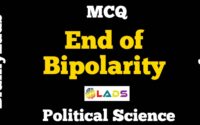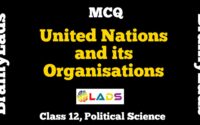MCQ of Challenges of Nation Building | Class 12 | Political Science |
MCQ of Challenges of Nation Building | Class 12 | Political Science | Term 1 |
1) Name the first prime minister of independent India?
a) Jawaharlal Nehru
b) Dr. Rajendra Prasad
c) Lal Bahadur Shastri
d) B.R. Ambedkar
ANSWER – Jawaharlal Nehru
2) Which among the following was not a challenge that independent India faced?
a) Shape a nation that was united
b) Establish autocracy
c) Ensure the development and well being of entire society
d) None of the above
ANSWER – Establish Autocracy
3) British India was divided into –
a) India and Bangladesh
b) Pakistan and Bangladesh
c) Pakistan and Tibet
d) India and Pakistan
ANSWER – India and Pakistan
4) According to the ‘Two Nation Theory’, India consisted of not one but two people ______
a) Hindus and Christians
b) Hindus and Muslims
c) Muslims and Sikhs
d) Jains and Muslims
ANSWER – Hindus and Muslims
5) Concept of ‘two nation theory’ was –
a) That Muslims and non – Muslims should be two separate nations
b) That there should be different countries for all the different religions
c) Muslims should be given autonomy
d) None of the above
ANSWER – That Muslims and non – Muslims should be two separate nations
6) Which of the following was the outcome of two nation theory?
a) Partition of India, Pakistan, and Bangladesh
b) Partition of British India into India and Pakistan
c) Partition of all the minorities from India
d) Partition of east and West Pakistan
ANSWER – Partition of British India into India and Pakistan
7) Who was known as frontier Gandhi?
a) Khan Abdul Ghaffar khan
b) Mohammad Ali Jinnah
c) Jawaharlal Nehru
d) Dr. Rajendra Prasad
ANSWER – Khan Abdul Ghaffar Khan
8) In context with the partition, the term ‘religious majorities’ means –
a) That Hindu majority is to be separated with all other minority groups
b) That only minorities will remain in India
c) Both A and B
d) That areas where Muslims were in majority would make up the territory of Pakistan
ANSWER- That areas where Muslims were in majority would make up the territory of Pakistan
9) Who delivered the famous speech ‘Tryst with Destiny’?
a) Sardar Vallabhai Patel
b) Mahatma Gandhi
c) Jawaharlal Nehru
d) Lal Bahadur Shastri
ANSWER – Jawaharlal Nehru
10) Which among the following statement about the problems/difficulties faced during partition is incorrect?
a) In British India there was no single belt consisting Muslim majority
b) Two of Muslim majority provinces of British India, Bengal and Gujarat, had very large areas of non Muslim majority
c) Among the Muslim majority areas not all of them wanted to be a part of Pakistan
d) Problems of ‘minorities’ on both sides of the border
ANSWER – Two of Muslim majority provinces of British India, Bengal and Gujarat, had very large areas of non Muslim majority
You may also read MCQ of Planning and Development, MCQ of India’s Foreign Policy, MCQ of Cold War Era and Non Aligned Movement, MCQ of End of Bipolarity, MCQ of United Nations and Organisations for better understanding of the chapters.
11) What was the % of Muslim population in India in 1951?
a) 15%
b) 12%
c) 10%
d) 5%
ANSWER – 12%
12) Which statement about the consequences of partition is correct?
a) People of one community eliminated people of other community in the name of religion and cities like Kolkata, Amritsar and Lahore became communal zones
b) Around 5 to 10 lakh people were killed in consequence of partition
c) Both A and B
d) None of the above
ANSWER – Both A and B
13) Writers and poets described partition as –
a) Division of properties
b) Division of liabilities and assets
c) Political division of the country
d) Division of hearts
ANSWER – Division of hearts
14) The _______ was formed to protect the interest of the Muslims in colonial India.
a) Princely states
b) Muslim league
c) Hindu community
d) Both B and C
ANSWER – Muslim league
15) Princely states were ruled by
a) British government
b) Indian government
c) Princess
d) Prime minister
ANSWER – Princess
16) The “Communal zones” exclude –
a) Lahore
b) Travancore
c) Amritsar
d) Calcutta
ANSWER – Travancore
17) British India provinces were controlled by?
a) Princes
b) British government
c) British citizens
d) None of the above
ANSWER – British government
18) How many princely states were there at the time of independence?
a) 590
b) 568
c) 565
d) 560
ANSWER – 565
19) What do you mean by the ‘British paramountcy’ or ‘suzerainty’?
a) Some form of control over their internal affairs was enjoyed by Princely states
b) The British province were directly under the control of British government
c) The dominance of the British government
d) Both A and B
ANSWER – Some form of control over their internal affairs was enjoyed by princely states
20) Instrument of accession means –
a) State agreed to become a part of the union of India
b) State disagreed to become a part of the union of India
c) State wants autonomy
d) None of the above
ANSWER – State agreed to become a part of the union of India
21) Name the first deputy Prime minister of India?
a) Jawaharlal Nehru
b) Dr. B.R. Ambedkar
c) Sardar Vallabhai Patel
d) Khan Abdul Ghaffar Khan
ANSWER – Sardar Vallabhai Patel
22) A Para military force of Nizam of Hyderabad which was sent to respond people’s movement was known as _______
a) LTTE
b) Nizam’s Army
c) Indian Army
d) Razakars
ANSWER – Razakars
23) Who was the maharaja of Manipur at the time of independence?
a) Krishnadatta Chamaraja
b) Bodhachandra Singh
c) Chandragupta Maurya
d) Ajatasatru
ANSWER – Bodhachandra Singh
24) Which was the first Indian state to hold an election based on universal adult franchise in June 1948?
a) Meghalaya
b) Telangana
c) Manipur
d) Hyderabad
ANSWER – Manipur
25) When was the merger agreement between maharaja of Manipur and the government of India signed?
a) Sep, 1949
b) July, 1948
c) Sep, 1948
d) June, 1947
ANSWER – Sep,1949
26) Movement for a separate Andhra was called –
a) Andhra movement
b) Telugu movement
c) Vishalandhra movement
d) None of the above
ANSWER – Vishalandhra Movement
27) Name the veteran gandhian (also a congress leader) who went on indefinite fast that led to his death after 56 days
a) Chandresh Reddy
b) Potti Sriramulu
c) Saket Vishwa
d) Gaurav Patel
ANSWER – Potti Sriramulu
28) Prime minister announced the formation of a separate Andhra state in ______
a) December 1950
b) January 1952
c) November 1951
d) December 1952
ANSWER – December 1952
29) In which year was the State reorganization commission was appointed?
a) 1951
b) 1955
c) 1953
d) 1952
ANSWER – 1953
30) Who played a vital role in the integration of princely states with India?
a) Sardar Vallabhai patel
b) Mahatma Gandhi
c) Dr. B.R. Ambedkar
d) Lal Bahadur Shastri
ANSWER – Sardar Vallabhai Patel
31) States created in 1960 were ________
a) Tripura and Rajasthan
b) Maharashtra and Gujarat
c) Meghalaya and Assam
d) Punjab and Haryana
ANSWER – Maharashtra and Gujarat
32) Which of the following state was not created in 2000?
a) Chhattisgarh
b) Assam
c) Uttrakhand
d) Jharkhand
ANSWER – Assam
33) Meghalaya was carved out from?
a) Assam
b) Manipur
c) Tripura
d) Sikkim
ANSWER – Assam
34) Which of the following princely state not resisted joining India?
a) Hyderabad
b) Manipur
c) Kashmir
d) Mysore
ANSWER – Mysore
35) Mention the base of the state reorganization act in 1956?
a) Religion
b) Language
c) Ethnicity
d) Both A and B
ANSWER – Language
36) Gujarat was carved out from
a) Maharashtra
b) Andhra Pradesh
c) Madhya Pradesh
d) Bombay
ANSWER – Bombay
37) Haryana was carved out from –
a) Punjab
b) Himachal Pradesh
c) Uttar Pradesh
d) Rajasthan
ANSWER – Punjab
38) ‘THE DAWN OF FREEDOM’ was written by –
a) Mohammad Ali Jinnah
b) Jawaharlal Nehru
c) Faiz Ahmed Faiz
d) Amrita Pritam
ANSWER – Faiz Ahmed Faiz
39) When Mohammad Ali Jinnah addressed the constituent assembly of Pakistan at Karachi?
a) 11 August 1947
b) 13 August 1948
c) 14 August 1947
d) 16 August 1947
ANSWER – 11 August 1947
40) Famous poet, Amrita Pritam was from –
a) Assam
b) Bihar
c) Punjab
d) Jammu and Kashmir
ANSWER – Punjab
41) When Meghalaya was carved out of Assam?
a) 1972
b) 1960
c) 1966
d) 1965
ANSWER – 1972
42) When Haryana was carved out of Punjab?
a) 1965
b) 1962
c) 1966
d) 1963
ANSWER – 1966
Related
Do share this post if you liked the MCQ of Challenges of Nation Building. For more updates, keep logging on BrainyLads



Very helpful and latest questions answered was there
It was very helpful for exam
Nice McQ bhut achha laga padkye
very helpful for term 1 examination👌🙂
Great mcqs, kindly include case based and assertion reason question also, otherwise amazing
Best and very very helpful mcqs thank for sharing
I like the questions very much. They help me in preparations of my exams.
After reading these MCQ I think some of them will definitely come in Term 1…😏